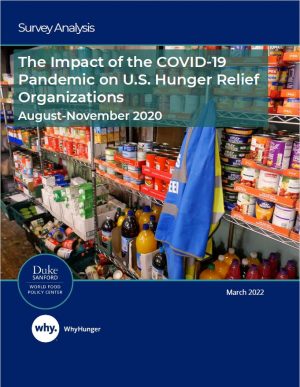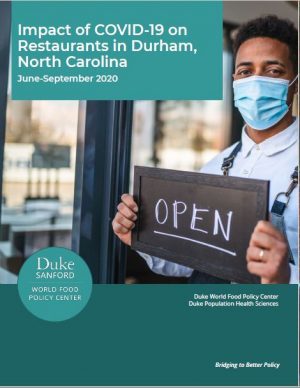
As a passionate champion of childhood nutrition and development, she worked on projects such as lactation support at Duke, supervising development of visualization of early childhood services in Durham, and a feasibility study of the central kitchens serving child care centers in rural North Carolina. She organized Early Childhood Development & Nutritional Summit in 2018. She served on multiple boards as it relates to early childhood nutrition and development, most notably the NC Farm to Preschool Network Advisory Board.
Research Reports
The Impact of the COVID-19 Pandemic on U.S. Hunger Relief Organizations: August-November 2020
This study is a detailed and nuanced story about COVID-19’s impact on food insecurity in the U.S. through the experiences of private, charitable non-profit organizations. These Hunger Relief Organizations (HROs), such as Food Banks, food pantries, and anti-hunger Advocacy Organizations, were on the front lines of food assistance, ensuring people who were in need got access to food during the most worrisome months of the pandemic. This research sampled the experiences and activities of these HROs across the U.S. from June through September 2020.
Impact of COVID-19 on Restaurants in Durham, North Carolina: June-September 2020
The COVID-19 pandemic affected industries where indoor person-to-person contact is the norm. This study documents the consequences of the COVID-19 pandemic-related government restrictions on the Durham, North Carolina restaurant industry by late summer of 2020. Sixty-four restaurant businesses in Durham, North Carolina participated in the survey between June-September 2020. Participating restaurants were mainly locally-owned businesses. The survey captured the type of restaurants (e.g. range of annual sales, ownership, etc.); the impact of COVID-19 on sales, employees, supply chains, support needed by the restaurant industry; and additional commentary in order to give space to elaborate.


